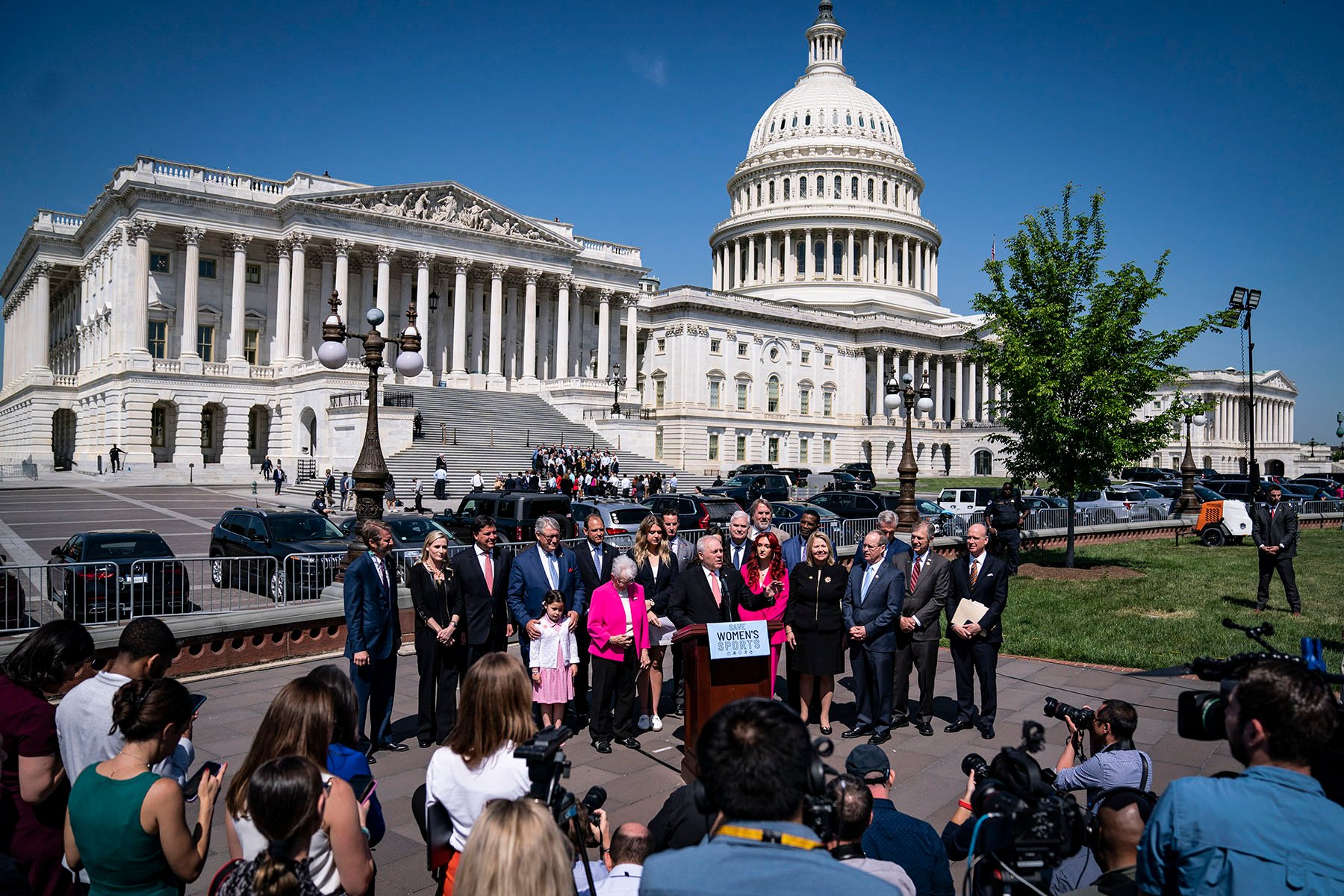Editor’s note: This article has been updated to include further comment from Equal Rights Advocates about their response plans.
The House on Tuesday voted 218-206 to ban transgender girls and women from girls’ sports in federally-funded schools by amending Title IX, the federal civil rights law that prohibits sex discrimination in educational institutions. This bill, the first federal anti-trans law brought to a vote in a newly GOP-controlled Congress, is Democrats’ first test on whether they will fight an expected wave of proposed anti-trans laws under President-elect Donald Trump.
If passed into law, this legislation would change Title IX and revoke federal funding for schools that allow trans girls and women in sports teams that align with their gender identity. Public K-12 schools would be implicated by this new rule, as well as colleges and universities. The bill was brought by Rep. Greg Steube of Florida, who reintroduced legislation he had previously tried to get through the House, alongside an identical bill in the Senate from Sen. Tommy Tuberville of Alabama.
This legislation would change the actual statute of Title IX to explicitly exclude transgender people from a federal civil rights law — a major setback for LGBTQ+ rights that would leave trans and nonbinary students more open to discrimination and with fewer avenues to fight it. Notably, the effect of this law would go further than a recent judicial ruling in Kentucky that rolled back Title IX protections nationwide for LGBTQ+ students.
Two House Democrats voted in support of the bill, which depicts transgender girls as men, whereas House Republicans voted along party lines. 3 Republicans and 6 Democrats abstained from voting. One House Democrat voted “present.” The Senate version of the bill is not yet scheduled for a vote, but is also expected to be fast-tracked through the legislative process. Senate Democrats may filibuster the bill, derailing its advancement or even stalling it permanently, but it is unclear whether enough of them will commit to doing so in a political environment that has become increasingly hostile to transgender rights.
This legislation is much more dangerous than the ruling out of Kentucky, said Maha Ibrahim, a program managing attorney at Equal Rights Advocates, because it would change the actual statute of Title IX — whereas that judge’s decision erased regulations made under the Biden administration that weren’t in place long enough for students to see the difference.
“When Congress gets away with things, that’s when we lose rights,” she said. “This needs to be really strenuously fought.”
Ibrahim, who worked with other attorneys to sue the Trump administration over its Title IX rules in 2018 and 2020, said that advocates would likely continue to fight this bill if passed into law. “We certainly aren’t foreclosing the possibility of a lawsuit, but we can’t affirmatively commit to a lawsuit right now — other groups may be better positioned, and we still need to do deeper analysis,” Ibrahim said. ERA will analyze the bills and work with their partner organizations, she said. State nondiscrimination protections would also still have an impact on how LGBTQ+ students are treated if this bill becomes law, she said.
Biden’s Title IX regulations allowed LGBTQ+ students to fight discrimination without mounting a lawsuit; instead, they could just file a complaint with the Education Department’s Office of Civil Rights, which is less stressful and time-consuming. After last week’s ruling, that’s no longer the case. But, Ibrahim said, advocates and legal experts were not depending on these regulations.
“We were suing for decades on the basis of the statute only,” she said. This federal judge in Kentucky deleted the Biden administration’s efforts to be explicit about how transgender students are protected at schools, but he did not touch their inclusion in gender equity laws. “That’s only the purview of Congress,” she said.
This bill in Congress would have that effect. Through this legislation, Congress is trying to define what gender discrimination is based on traditional gender norms, said Seth Chandler, a constitutional law professor at the University of Houston Law Center. This legislation doesn’t leave much ambiguity, and the only way to overturn it would be to make a constitutional challenge — which he sees as a difficult undertaking.
The ban also calls for the Government Accountability Office to conduct a study on any adverse psychological or developmental effects felt by cisgender girls playing sports with transgender girls.
Research has found that trans women who undergo testosterone suppression through gender-affirming care have no clear biological advantages over cis women in elite sports. Trans athletes have also pointed out that athletic ability among trans people varies just as it does for cisgender people. The NCAA, the largest college sports governing body in the country, calls for each sport’s national governing body to set rules for transgender student-athletes.
Rep. Lori Trahan, a Massachusetts Democrat, called the bill on Tuesday “a federal takeover of sports on all levels.” Trahan, who played Division 1 sports in college and is the mother of two girls, said on the House floor that Republicans’ approach to this issue will have devastating consequences. She invoked what enforcement of such a law could look like.
“Girls as young as four years old, being subjected to invasive lines of questioning about their bodies, and even physical inspections by an adult stranger, a predator, all because some creep accuses them of not being a girl?” she said.
House Republicans skirted questions from Democrats about how the bill would be enforced. Rep. Mark Takano, Chair of the Congressional Equality Caucus, and other Democrats portrayed the bill as the “Child Predator Empowerment Act,” saying that it would accelerate a national crisis of sexual assault on women and young girls — and that it would put a target on the back of every young woman who plays school sports.
On the House floor before Tuesday’s vote, Steube railed against the concept of transgender identity as a whole, saying that terms such as “nonbinary,” “trans man,” and “trans women” were made up. However, transgender people and gender diverse people have existed throughout history and in different cultures.






